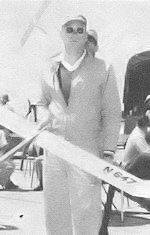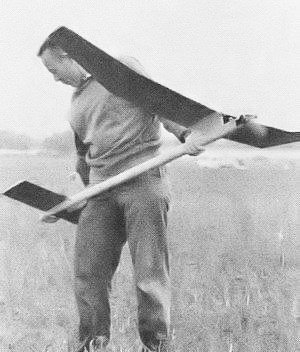|
Being risk averse by nature, I have always
shied away from "serious" free flight for fear of losing a model to a passing thermal
or an unobserved wind carrying a model into the hinterlands or into the tops of
trees. Having at least control of the rudder to make the ship turn around as necessary
always seems the prudent approach. Still, there are thousands of daredevils who
willingly risk all for the chance to set a new personal record and/or practice for
a competition, relying on a dethermalizer and a lot of skill to stave off disaster.
They surely are a hardy bunch. This "No Strings Attached" column from the May/June
1963 edition of American Modeler magazine reports on "Lucky" Bill Hartill,
whose FF ship was whisked away by one of those aforementioned thermals, deemed lost
forever, and then a few hours later found and returned by a farmer who saw it landing
in his field 8 miles away. That's just one of many instances, evidently, where "Lucky"
earned his nickname. No Strings Attached
Free Flight Commentary by "Battling Bob" Hatschek
 Like Gaul in the days of Julius Caesar, model
aviation is divided into three parts - free flight, radio control, and control line.
All too often, the devotees of these various phases don't know each other, or give
a hoot about the other two sides of the triangle. Like Gaul in the days of Julius Caesar, model
aviation is divided into three parts - free flight, radio control, and control line.
All too often, the devotees of these various phases don't know each other, or give
a hoot about the other two sides of the triangle.
This is one reason why LIAMAC is such a great thing. That stands for Long Island
Association of Model Airplane Clubs. As this went to press, there were already eight
clubs in the group. Comprising free flight, radio, and ukie, they've banded together
for numerical support before the politicians in getting flying sites. All kinds
of flying sites.
Born only a few months ago, LIAMAC has already located and obtained the use of
two control line fields, received permission to fly indoor models in a Category
I building, and has found and is negotiating for the right to fly free flights on
some county-owned property on Long Island. One of its free flight clubs is even
conducting a ukie contest - which includes a hand-launch glider event to entertain
the controliners with at least one F/F event.
Ritz's Latest A/2
When out in Chicago recently I looked up Gerry Ritz, 1959 World Nordic Glider
Champ. His newest towliner has a number of interesting features. Very high aspect
ratio wing spans about 8 ft. Has "V" dihedral, straight taper and sweep back. The
moderate sweep, says Gerry, is for better directional stability. Ship has a tapered,
rolled sheet, tubular tail boom, which GR reports is nice and light, but lacks adequate
strength. (Everybody learns something from a new design - especially the champs.)
The boom bayonets into a lathe-turned aluminum front end. Very short nose, which
improves longitudinal stability.
I didn't get to see the ship fly - it had been 14 below that morning and snowing
- but she has all the makings of a great one.


A free·flighter you ought to meet, declares Hatschek, is Bill Hartill (above)
seen adjusting fuse length before releasing FAI plane, "I don't work for a living
- they pay me for my hobby," says Southern California aerodynamicist and model flyer
Hartill. (Hatschek at top.)
Inter-American Champs
Since Ritz is also chairman of the Free Flight International Competition Committee
of the AMA, I asked for the latest info on the Inter-American Championships. This
is scheduled for 1964 and every year thereafter in which a World Championship free
flight meet is not on the FAI calendar. Events are FAI Gas, Wakefield rubber and
Nordic A/2 towline glider. Teams will be invited from all Western Hemisphere nations
and the first one, in '64, is to be hosted by the United States.
Though final decision has not been made most likely site will be Southern California,
says Ritz. Organizations in several areas of the U.S. volunteered to hold the finals,
but the Westerners seem to have come up with the best package of field, housing,
contest personnel, and other necessary facilities.
U.S. team selection will be run this year. And it will be pretty much the same
as last year's selection of our World Championship teams. If anything, even more
open. I know that in the New York City area plans are being made for three qualifying
trials to be held in June, July and August. Semi Final Meets in the East, Midwest
and West are set for the Labor Day weekend.
This fills the gap left when the FAI decided to hold free flight championships
only every other year. The Canadians are very enthusiastic about it. And two South
American countries have already said they'll join the fun. Give credit to Don Thompson,
Midlothian, Ill.; he's the man handling all the administrative details.
Stamp Collector?
Mailman brought a letter from Taiwan today. That's also known as Formosa. Y.
K .. Chien and his group of fellow modelers are beginning to work on Wakefields,
and they feel my "Sky-Scraper" is a good starting point. Their problem is that they
can't get the instrument bearings specified in my plans. Could I please send some?
Well, I have now sent precision bearings to every continent except Antarctica.
My source of supply is American Surplus Trading Co., 332 Canal St., New York 13,
N. Y. I use type R2 bearings, which have an inside diameter of 1/8", an out-side
diameter of 3/8" and a face width of 5/32". Seven 1/16" balls handle both thrust
and radial loads. Every nose block takes a pair. And they can handle all the Pirelli
you can pack into a Wakefield or an Unlimited class rubber job.
FFYOTM
It's been my pleasure to know "Lucky" Bill Hartill for the past ten years or
so. He's one of the outstanding model airplane designers, builders and flyers. But
the thing that sticks in my mind every time I think about Bill is the phenomenal
luck he has had over the years in retrieving errant free flight models. You ought
to met him.
Exhibit A
At an FAI elimination a few years back his Number One gas job went out of sight
on the second or third round. L-o-n-g fuse. A short while later I happened to have
a long, hot chase, too. So, on the way back, I stopped at the airport's flight shack
for a "Coke". Fellow at the desk asked me if I knew a Bill Hartill. Seems Bill's
wife had called. A farmer chanced to see Bill's ship come down in his field (8 miles
from the contest site), picked it up, saw the phone number, and called Bill's home.
By pure chance, I had happened by the airport office just after the call came in.
Bill called his wife for the farmer's address, then went to pick up the ship. He
missed only one round with it.
Exhibit B
This time it was an FAI semi final. Bill had four maxes, but someone else already
had five. So Bill needed all he could get on the last flight - and he had creamed
his spare ship, so he had to have this one back for a flyoff if he was lucky. If
he was lucky - HAH! Another fellow and I volunteered to sit out on a hilltop about
three quarters of a mile downwind to pick up the ship. "Cut the fuse short, Bill,"
I said. Fat chancel After Bill's gas job did the 3 minute max it hit a really booming
thermal and went way over us on that far out hilltop. We stayed there to get a good
line on it - as it crossed the river and finally dethermalized into the woods. The
other retriever and I dashed for our car and raced for the bridge. We drove as far
into the woods as we could, then we hoofed. Searching was just hopeless in that
jungle. So we decided to go out to the edge of the woods and wait for Bill. On the
way out, there it was in the top of a tree at the edge of a little clearing. By
the time Bill drove out there, we had it down.
Exhibit C
Now we shift the scene to a Chicago Nats. Bill had a long flight in class A gas
(he wound up that event with three maxes) and was wandering along looking for his
ship. He saw it in the tippy top of a tall tree right by the road. Only you just
couldn't climb that tree. Bill's guardian angel was true to him, though. Along came
a power company trouble-shooting truck. You know, one of those jobs with the extensible
ladders. Well, they were nice guys and gave Bill a hand. Had the ship down in no
time.
I don't mean to run down Bill's ability. He's really one of the most skillful
free flighters in this favorite game of ours. But his luck is enough to discourage
any competitor. Here's how he came by that luck. Back in World War II, Bill was
flight engineer aboard a C-46 in a combat cargo group. One of those jobs that used
to fly the "hump" over the mountains from Burma into China. Some of the cargos Bill's
ship hauled were gasoline, Bailey bridge sections, tank engines, Army shoes, paratroopers,
even mules.
Well, one day near the end of the war, and after 400 hours of combat flying,
Bill joined the Caterpillar Club. All you have to do to qualify is have your neck
saved by a parachute. They were flying from Kunming to Shanghai on a dark, cloudy
night. No extra gas, of course - it weighed too much. And when they came down through
the cloud layer there wasn't any land - just the East China Sea. So they turned
west, almost out of gas, and as soon as they got back over land the four of them
bailed out.
Bill said the landing was real soft. Landed in a pile of fertilizer. That's where
the legend of the Hartill luck began.
A modeler for 23 years, Bill, 38, is past president and was one of the founders
of the famous SCAT Club - the Southern California Aero Team, a bunch of real gone
international class flyers in the Los Angeles area. Bill's made three U.S. world
championship teams - power twice and Nordic glider once. His most recent big win
was in Nordic glider at the 1962 Nats.
When Bill steps out of his workshop and into his job, he goes from a few miles
per hour to some really fast airflows. He's a senior research engineer at The Marquardt
Corp. working in a project group developing hypersonic ramjet engines to operate
at several times the speed of sound. His specialty is the design, analysis and testing
of inlets. It involves a combination of aerodynamics and thermodynamics. His degree
from Rutgers is in mechanical engineering.
Other hobbies and pastimes include camping, cabinet making and sports cars -
he's restoring an MG-TF these days. He plans to take up full scale soaring. Bill
and wife Inza have three sons, Russell 7, Billy 5, and Brian 2.
Posted October 16, 2023
(updated from original
post on 11/24/2012)
|